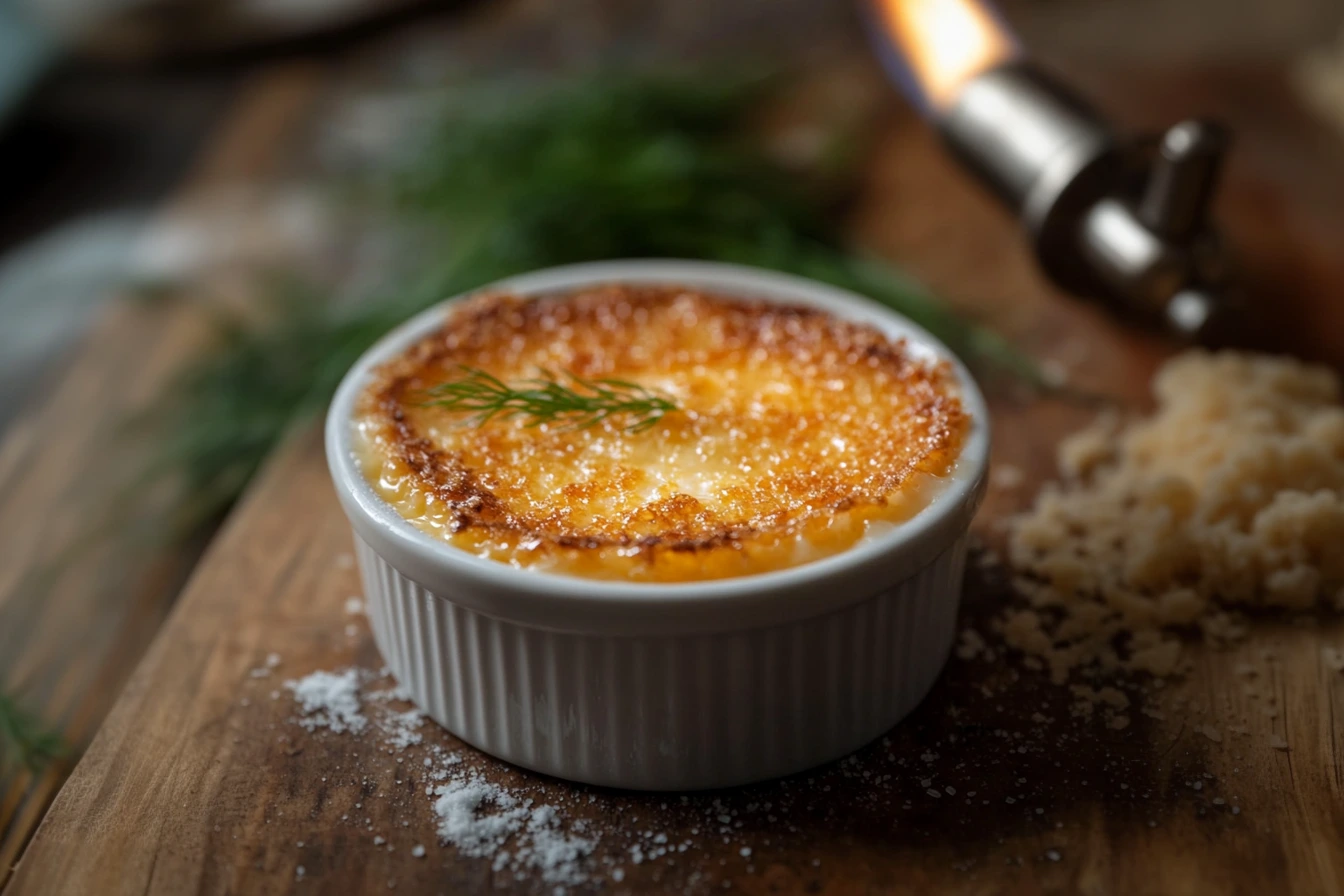Crab Brûlée is an extraordinary culinary creation that merges the creamy texture of custard with the savory decadence of crab meat. This dish is a perfect showcase of how the right ingredients, combined with precise techniques, can elevate a simple recipe into an unforgettable experience. In this article, we’ll explore everything you need to know to create this delightful dish at home—from understanding the ingredients and equipment to perfecting the caramelized sugar crust. Whether you’re an experienced chef or a home cook ready to impress, you’ll find plenty of tips, tricks, and inspiration here.
Table of contents
Introduction to Crab Brûlée
The Origins of Crab Brûlée
Crab Brûlée is a modern twist on the classic crème brûlée, a French dessert renowned for its silky custard base and caramelized sugar top. While the traditional version is sweet, this savory adaptation takes the dish to a whole new level by incorporating lump crab meat as its star ingredient. Interestingly, the idea of blending savory and dessert elements emerged as chefs started experimenting with fusion cuisines. As a result, this innovative recipe brings together two worlds, surprising and delighting anyone who tries it.
Why Choose Crab Brûlée?
There’s no denying the charm of Crab Brûlée. First and foremost, it’s a perfect marriage of savory seafood flavors and the rich creaminess of a custard base. Furthermore, it’s an elegant choice for special occasions, dinner parties, or even intimate family gatherings. In addition, its unique flavor profile appeals to adventurous eaters who love bold yet balanced dishes. Ultimately, Crab Brûlée offers a brilliant way to showcase premium crab meat in a recipe that is as stunning to look at as it is to taste.
Understanding the Ingredients
The Role of Cream and Eggs in the Custard
The cream and eggs in Crab Brûlée aren’t just for show; they’re the backbone of its luscious, velvety texture. Use heavy cream for richness and whole eggs for structure. The interplay between the two ingredients ensures the custard base holds together while still feeling indulgently smooth. Remember, a touch of balance is key—too many eggs can make the custard rubbery, while too much cream might leave it overly runny.
Enhancing Flavor with Seasonings
Seasonings in Crab Brûlée elevate its complexity, making the dish truly sing. Subtle additions like garlic, shallots, or fresh herbs such as dill or chives complement the sweetness of the crab. A pinch of paprika or cayenne pepper can lend a gentle warmth without overpowering the delicate seafood notes. Don’t forget the salt! Seasoning the custard evenly is critical for a cohesive flavor profile.
Essential Equipment for Making Crab Brûlée
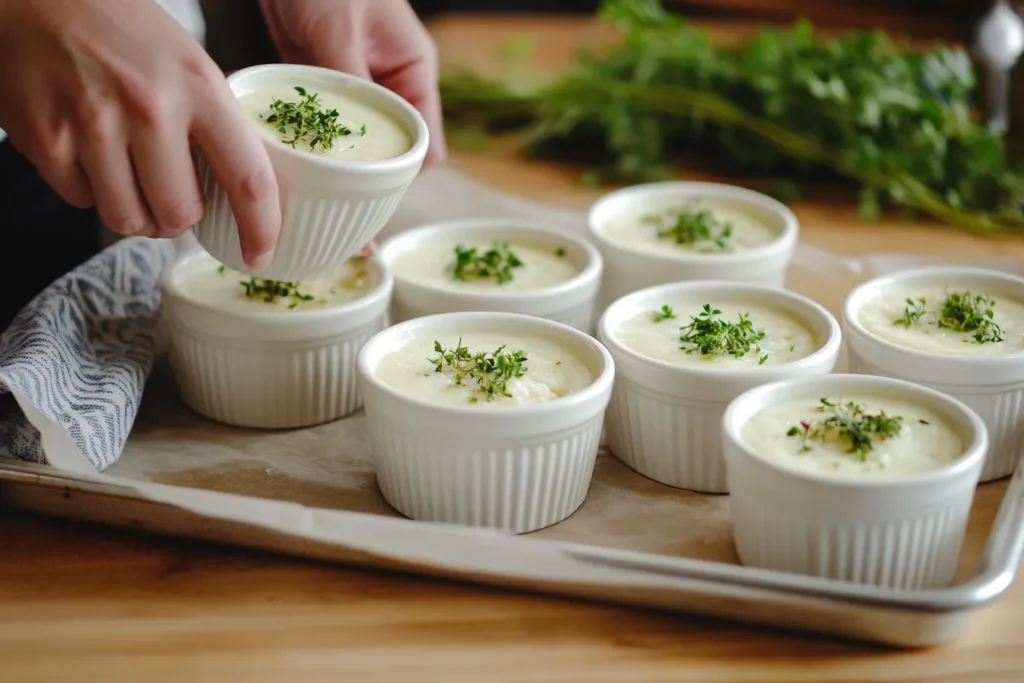
Choosing the Right Ramekins
Ramekins, without a doubt, are the unsung heroes of Crab Brûlée. These small, heatproof dishes not only ensure even cooking but also help achieve the perfect portion size for serving. For the best results, opt for ramekins that are 4 to 6 ounces in capacity. Moreover, their shallow design allows the custard to cook uniformly, thereby preventing a raw center or overcooked edges. Additionally, ceramic ramekins are an excellent choice because they retain heat well and lend a classic, elegant aesthetic to the presentation.
The Importance of a Kitchen Torch
To achieve the iconic caramelized sugar crust on top of your Crab Brûlée, a kitchen torch is a must-have tool. This handy device provides precise, controlled heat, allowing you to melt and caramelize the sugar without baking the custard further. While a broiler is a possible alternative, it doesn’t provide the same level of control. If you don’t already own a kitchen torch, investing in one is worth it, especially if you enjoy experimenting with culinary techniques like brûléing or finishing dishes with flair.
Having the right equipment not only makes preparation easier but also ensures your Crab Brûlée turns out as impressive as it is delicious. Let’s dive into the next section where we’ll cover the step-by-step process of making this gourmet masterpiece.
Step-by-Step Preparation of Crab Brûlée
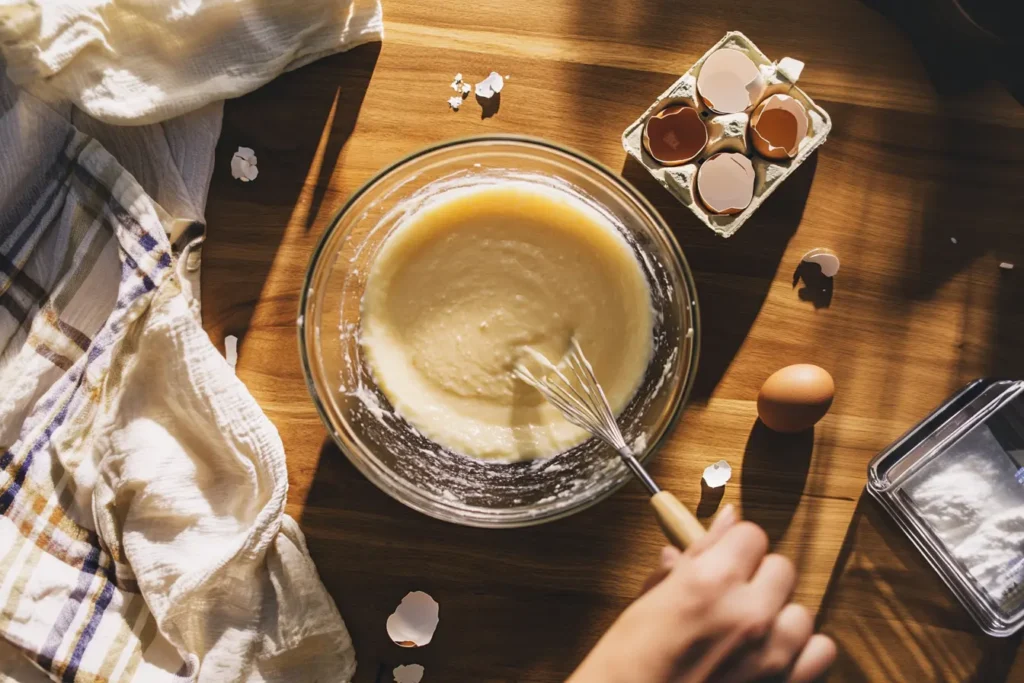
Preparing the Custard Base
The custard is the heart of Crab Brûlée, and getting it right is essential. Begin by whisking together heavy cream, eggs, and egg yolks until the mixture is smooth and uniform. Add a touch of salt and a pinch of your chosen seasonings, such as paprika or cayenne, for a subtle kick. For added depth, sauté finely chopped shallots and garlic until fragrant, then incorporate them into the custard mixture. This step infuses the base with a savory undertone that complements the sweetness of the crab.
Incorporating Crab Meat into the Custard
Once your custard base is prepared, gently fold in the lump crab meat. Be cautious not to overmix, as the delicate crab can break apart. Distribute the crab evenly to ensure every bite has a balance of creamy custard and flavorful seafood. If desired, sprinkle in fresh herbs such as dill or parsley for a touch of freshness and color.
Baking the Custard to Perfection
Preheat your oven to 325°F (163°C) and prepare a water bath—a technique that ensures even, gentle cooking. Place your ramekins in a deep baking dish and pour the custard mixture into each ramekin, leaving a small gap at the top. Carefully fill the dish with hot water, ensuring the water reaches about halfway up the sides of the ramekins. Bake for 30–40 minutes or until the custard is set but still slightly jiggly in the center. Remove from the oven, allow them to cool, and refrigerate for at least two hours to let the flavors meld.
Next, we’ll explore the art of achieving the perfect caramelized sugar crust, the finishing touch that transforms Crab Brûlée into a culinary masterpiece.
Achieving the Perfect Caramelized Sugar Crust
Techniques for Caramelizing Sugar
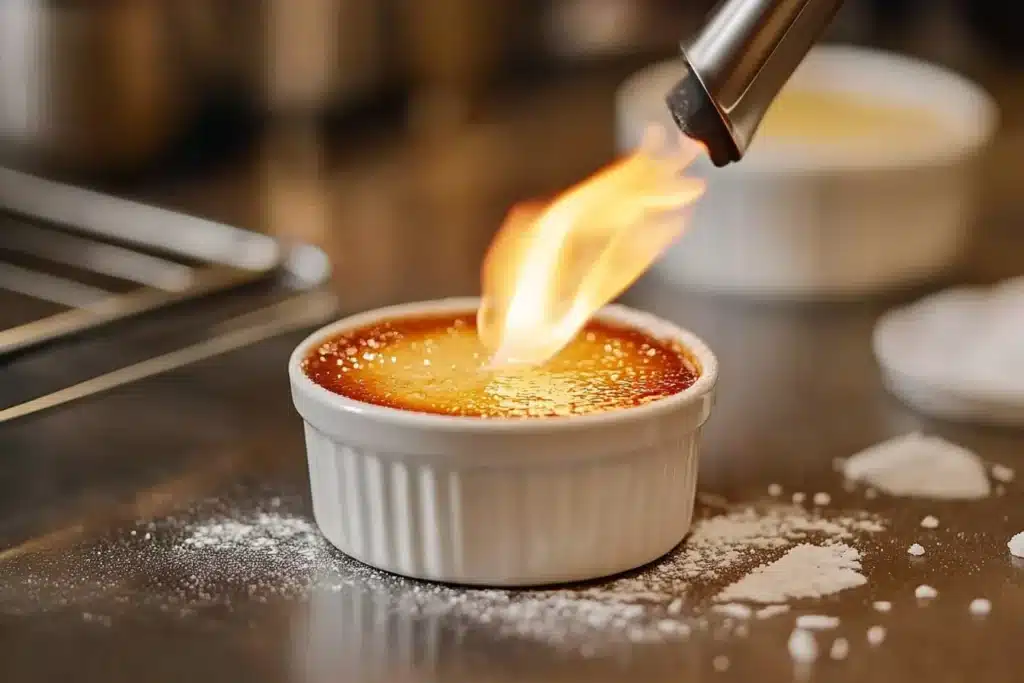
The caramelized sugar crust is, without a doubt, what truly sets Crab Brûlée apart from other savory dishes. Not only does it create a delightful contrast between the creamy custard and the crisp topping, but it also adds a touch of elegance that elevates the dish to a whole new level.
To begin, sprinkle a thin, even layer of granulated sugar over the chilled custard. For optimal results, ensure the sugar layer is neither too thick nor too thin. Specifically, a thick layer might not caramelize evenly, while an overly thin layer could burn too quickly, compromising the texture and taste.
Afterward, take your kitchen torch and apply steady, controlled heat to the surface. For uniform caramelization, move the flame in small, circular motions across the sugar layer. As you apply heat, you’ll notice the sugar starting to bubble and gradually transform into a golden-brown crust.
Finally, aim for a glassy, crackling surface with no dark spots, as this provides the perfect texture and appearance. If you don’t have a kitchen torch, you can use a broiler, but watch closely to avoid burning.
Common Mistakes to Avoid
Caramelizing sugar might seem simple, but there are pitfalls to watch out for:
- Uneven sugar distribution: This can lead to uneven caramelization. Spread the sugar evenly across the custard surface before torching.
- Holding the torch too close: Keeping the flame too close can burn the sugar and leave a bitter taste. Maintain a slight distance for controlled heat.
- Over-torching the custard: Applying heat for too long can warm the custard, affecting its creamy texture. Torch the sugar quickly and let it cool.
With the caramelized sugar crust perfected, you’re one step closer to presenting this gourmet dish. Next, we’ll dive into serving suggestions and creative pairings to enhance the dining experience.
Serving Suggestions and Pairings
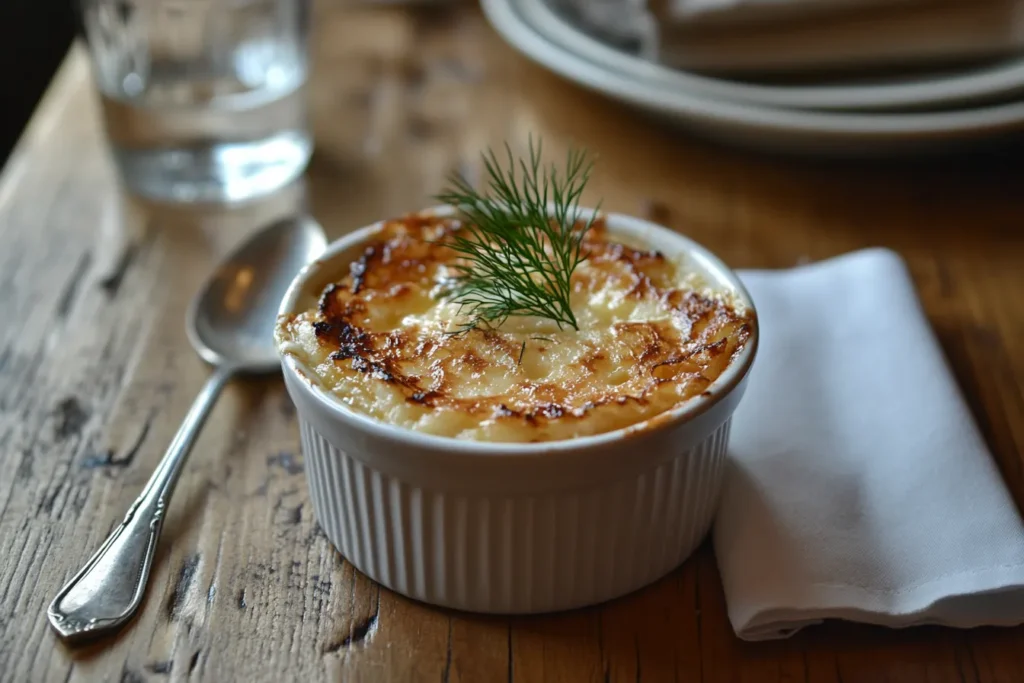
Ideal Accompaniments for Crab Brûlée
When serving Crab Brûlée, presentation and pairings play a key role in elevating the dish. Complement the creamy, savory flavors with light, refreshing sides. A crisp green salad with a citrus vinaigrette adds brightness, while crusty bread or crostini provides a satisfying texture contrast. Garnish the brûlée with a sprig of fresh dill or parsley for a pop of color and a hint of herbal aroma.
For a more elaborate presentation, consider serving the Crab Brûlée as part of a seafood platter alongside shrimp cocktail or oysters. This approach makes it a show-stopping appetizer or a luxurious main course for special occasions.
Creative Flavor Pairings
Pairing flavors with Crab Brûlée is an opportunity to enhance its complex profile. Fresh herbs like chives, thyme, or cilantro work wonderfully as subtle flavor boosters. You could also serve it with a side of pickled ginger or a light cucumber salad to introduce a tangy contrast.
For those who love a touch of spice, a drizzle of chili oil on the side or a sprinkle of smoked paprika on top can add depth without overwhelming the dish. Keep accompaniments simple and complementary to let the sweetness of the crab shine through.
Serving suggestions bring out the best in Crab Brûlée, making it not just a dish but an experience. Next, let’s explore some exciting variations of this gourmet classic to keep your culinary adventures fresh and innovative.
Variations of Crab Brûlée
Incorporating Different Seafood
While lump crab meat is the star of traditional Crab Brûlée, swapping or combining it with other seafood can create exciting variations. Try incorporating lobster meat for a richer, more indulgent twist, or use finely chopped shrimp for a slightly firmer texture. For a unique coastal flair, scallops or even smoked salmon can be used, adding a bold flavor dimension to the custard.
Herb-Infused Crab Brûlée
Infusing the custard with aromatic herbs can elevate the dish’s flavor complexity. Rosemary, thyme, or tarragon pair beautifully with the sweetness of crab, lending earthy undertones. To infuse, simply steep fresh herbs in the cream during the heating process, then strain before mixing with the eggs. This subtle step adds a depth of flavor without altering the custard’s texture.
Spicy Crab Brûlée Variations
For those who enjoy a little heat, spicy Crab Brûlée is an excellent option. Incorporate finely minced jalapeños, a touch of cayenne pepper, or even a splash of hot sauce into the custard mixture. Top with a sprinkle of chili flakes after caramelizing the sugar crust for an extra burst of spice. This version pairs well with cooling sides like a cucumber and yogurt salad, balancing heat with freshness.
With these creative variations, you can tailor Crab Brûlée to suit any palate or occasion. Next, we’ll dive into expert tips to ensure your dish comes out flawless every time.
Expert Tips for Perfecting Crab Brûlée
Ensuring a Smooth Custard Texture
The hallmark of a great Crab Brûlée is its silky, smooth custard. To achieve this:
- Strain the custard base: Before folding in the lump crab meat, pass the custard mixture through a fine-mesh sieve. This removes any unwanted egg solids, ensuring a velvety texture.
- Avoid overbaking: Overbaking can cause the custard to become rubbery. Check for doneness by gently shaking the ramekins; the center should have a slight jiggle.
- Temper your ingredients: When combining hot cream with eggs, do so gradually. This prevents the eggs from scrambling and ensures a cohesive mixture.
Balancing Sweet and Savory Flavors
One of the most delightful aspects of Crab Brûlée is its balance between savory seafood flavors and the sweetness of the caramelized sugar crust. To perfect this harmony:
- Moderate sugar usage: Use just enough sugar on top to create a thin, crisp crust without overpowering the savory custard.
- Choose complementary seasonings: A touch of nutmeg or a hint of vanilla extract in the custard can subtly enhance the dish without making it overly sweet.
- Taste as you go: Always sample the custard mixture before baking to adjust salt, spices, and sweetness to your liking.
With these expert tips in your culinary toolkit, your Crab Brûlée will be nothing short of perfection. Up next, we’ll address common questions about this unique dish to round out your expertise.
Frequently Asked Questions About Crab Brûlée
What Is the Best Type of Crab for Crab Brûlée?
Fresh lump crab meat is ideal for Crab Brûlée due to its delicate, sweet flavor and tender texture. However, if fresh crab isn’t accessible, high-quality frozen or pasteurized crab meat can work well. Always check for a clean, natural aroma to ensure freshness.
How to caramelize brûlée?
Caramelizing crème brûlée is the moment where magic happens! With a sprinkle of sugar and the quick heat of a torch, a perfectly crisp caramel shell forms, sealing the creamy custard beneath. The trick? Even sugar coverage and just the right torching technique. Ready to master this iconic dessert finish? Check out our step-by-step guide to caramelizing crème brûlée!
What’s the difference between crème brûlée and custard?
Crème brûlée and custard share a velvety texture, but the key difference lies in their finishing touches. While custard is soft and often served plain or as a filling, crème brûlée is topped with a caramelized sugar crust that adds a delightful crunch. Both are made from similar ingredients, but their presentation and experience set them apart. For a deep dive into the techniques and recipes of these classic desserts. Check out more!
What Are Common Mistakes When Making Crab Brûlée?
Some frequent pitfalls include:
- Overcooking the custard: Leads to a grainy texture. Keep an eye on it during baking.
- Uneven sugar caramelization: Results in burnt or bitter patches. Distribute sugar evenly and use controlled torching.
- Not using a water bath: Causes uneven baking, potentially ruining the texture.
Can I Use Canned Crab Meat for This Recipe?
Yes, canned crab meat is an option if fresh or frozen isn’t available. Choose high-quality, minimally processed canned crab, and drain it thoroughly to avoid excess moisture in the custard.
What Are Some Variations of Crab Brûlée?
There are plenty of creative twists, such as adding lobster or shrimp, herb-infused custards, or even spicy versions with jalapeños or cayenne pepper. These variations allow you to customize the dish to suit different tastes and occasions.
With these FAQs, you’re armed with practical insights and solutions for crafting the perfect Crab Brûlée. In the final section, we’ll conclude with a summary of why this dish is a must-try for any food enthusiast.
Conclusion
Crab Brûlée is a true culinary masterpiece, effortlessly blending the creamy decadence of custard with the delicate sweetness of lump crab meat. Whether you’re preparing it for a special occasion or simply exploring bold new flavors, this dish is bound to impress. Moreover, the process of crafting it allows you to sharpen your culinary skills while enjoying a rewarding experience.
What makes Crab Brûlée even more remarkable is its versatility. For instance, you can stick to the classic recipe for a timeless appeal. Alternatively, you might experiment with exciting variations like herb-infused or spicy versions to cater to different tastes. Additionally, the balance between savory and sweet makes it a unique standout in any gourmet spread.
So, as you gather your ramekins and ignite your kitchen torch, consider how this dish can elevate your cooking repertoire. Ultimately, it’s not just a recipe—it’s an unforgettable experience that will delight your senses and leave a lasting impression on everyone who tries it.
In conclusion, happy cooking, and enjoy the journey of perfecting your Crab Brûlée !

